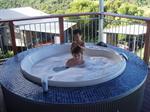Heating Pools And Spas
If you can keep the water in you pool or spa warmer; it is going to get more use – and for such a major investment, that is very important.There are two things you can do to keep a pool or spa warmer:
1.Heat it –heat the water
2.Insulate it –stop heat from being lost

To Heat or Not To Heat?
Not all pools need to be heated.To decide whether to install a heater, work out how many weeks/months you can extend your swimming season. Next, consider the cost of installation and the running costs.Do you want to keep the temperature at the same level for twenty-four hours a day, or only heat the pool when you want to use it?
SOURCES OF HEAT
There are many different ways to heat a pool or spa.The type of heater depends on:
- The size of the pool or spa.The greater the volume of water, the more heating capacity you will require.
- How much heat you need.In colder areas (and at colder times of the year) heat is lost more rapidly and pools require greater heating capacity.
- Installation costs.
- Running costs.A heater that is cheap to install may be more expensive in the long run, depending upon annual maintenance requirements and the cost of fuel.You should also consider the cost of adding water to the pool to replace evaporation losses.
- The lifespan of the heater.Most hot water systems can be expected to last at least ten years.It is advisable to purchase a heater with a long guarantee period.
Solar Heating
Solar power is the most effective way to heat your pool. There are a number of different ways to use solar power to heat your pool.
- Position the pool to receive maximum sunlight.
- Install a pool cover that will absorb and retain heat.
·Use a solar heater.A solar collector is installed on the roof of a house or nearby building.Water is pumped up on to the roof and the heated water fed back down into the pool.
These techniques can help extend your swimming season, but in cold weather they may not raise the pool water temperature as high as you would like. On a cool day, supplement your solar pool heater with a gas, electric or oil heater.When there is less sun, you will still be able to keep you pool warm.
Convection Gas Heater
Uses a large flame to heat slow moving water that is then pumped into the pool.They are relatively inexpensive and are suitable for use with small pools and spas.
Tank Gas Heater
This is like a normal hot water service.A large volume of slow moving water in a storage tank is heated by a gas flame.The flame fires up when the thermostat detects a lowering of the temperature.When the desired temperature is restored, the thermostat switches the heater off and a pilot light is left burning to allow the system to be automatically reignited again when the water temperature becomes too low.The tank is usually insulated and needs to be heavily insulated when operated in a cold climate. This system can be less expensive than a coil heater and is used for spas and small pools.
Gas Coil Heater
Known as a Flash heater, a circuit of pipe goes in and out of the pool, passing through a heater in between.A small amount of fast moving water is pumped through the system, with a flame heating one section of the pipe.The pipe then transfers the heat to the water in the pool.It can be used on any size pool.
SOLAR, ELECTRIC OR GAS?
The cost of operating different heating systems depends upon where you live. In some places, gas is cheap to buy and sunshine can be quite variable, so a combination of solar heating with a back up gas system is the best option for most situations. Electricity may however be cheaper than gas and the climate may or may not be predictable, so solar panels supported by an electric boost heater is a more economic option.
Electric Immersion Heater
An electrically powered element is immersed in the water.This type is only used for spas and is generally more expensive than gas systems.
Electric Heat Exchanger
A heat exchanger transfers heat from the air to water.They can be used for any size pool, but are generally more expensive to operate than gas.
Oil Heaters
Petroleum oil heaters can be used to heat pools, but they are usually more expensive and cause more pollution than gas or electric systems.
Slow Combustion Wood or Coal Heaters
Wood fires have been used to heat pools in the past, but they can be expensive to run.You also need to continually stoke the heater with fuel, which can be a nuisance.
HEATING A SPA
If you have a small spa that is used infrequently, it is possible to heat it with your domestic hot water service.All that is required is a heat pump to circulate the water and maintain the heat while you bathe.If it is a big spa (eg. 8 person), it may be preferable to retain the water in the spa when it is not in use.Depending on the heater and the weather conditions, a heater may take an hour or more to heat up the water each time you want to use it.This makes it difficult to decide to take a spa on the spur of the moment.
Heat Pumps
Heat pumps are a very economical way of heating your pool or spa.They draw air from the atmosphere and remove the heat from it by heating a refrigerant gas which is then compressed.This gas becomes extremely hot and is cooled in a heat exchanger by transferring the heat to the pool or spa water as it passes.Heat pumps are more suited to a temperate climate, and are easy to install.They can be quite expensive to purchase.

Want to Know More?
Consider doing a course or buying a reference book from our school.
If you would like to communicate with one of our professional tutors, consider using our free course counselling service. click for details
If you want to browse our bookshop, go to www.acsbookshop.com
To browse our courses, go to http://www.acsgarden.com/Courses/Default.aspx
More from ACS
Know your equipment -use the best tool for the job to save time, money and stress on the body.
View Course
Ebook - Inspiring: covers formal, natural, eclectic, modern, oriental, Mediterranean; zoom in on stunning images and plans.
View eBook
Ebook - Explores garden design ideas and inspires
garden design and landscaping!
View eBook
Enhance your design skills and apply them to various garden styles.
View Course
Ebook - 108 stunning pages and photos: ideal for landscapers, gardeners and home gardeners interested in creating beautiful water features.
View eBook
Ebook - Learn about these amazing plants, their identification and care with this informative text.
View eBook
Course - Discover a wide range of systems, simple and complex, and how to grow many different types of horticulturally valuable crops, such as cut flowers and vegetables.
View Course
Ebook - easy to read: home systems, commercial systems, media, fish species, fish care.
Planting guide and care; trouble shooting - fish and plants.
View eBook